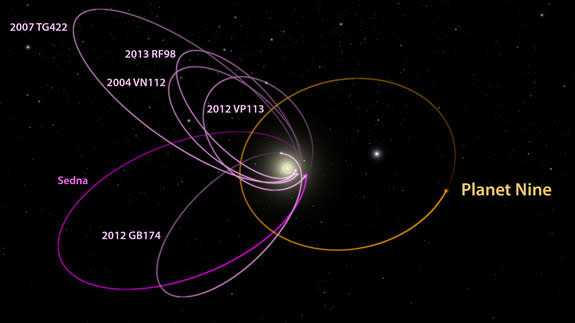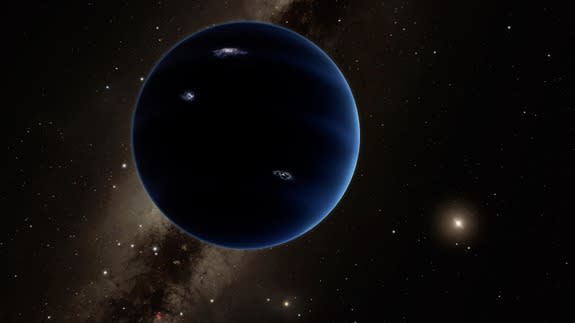How to name the possible ninth planet in our solar system

On Wednesday, a team of scientists revealed new evidence that a large planet may be orbiting the sun from the outskirts of the solar system. If such a world exists, it would be the ninth major planet in the solar system.
While researchers have no direct evidence of the object, they did see strange perturbations in the orbits of objects deep in the Kuiper Belt — the group of icy bodies in Pluto's part of space — that seem to suggest the existence of a planet one to 10 times more massive than Earth that orbits the sun every 10,000 to 20,000 years.
If confirmed, the discovery of the new planet would be unprecedented in this day and age. It would also present us with a unique challenge that humanity has not faced since planet Neptune was discovered in 1846.
If it's actually discovered, what will we name it?
See also: A large, unknown 9th planet lurks in our solar system, evidence suggests
The International Astronomical Union (IAU) is responsible for naming celestial objects that humans discover out in the universe. This means that the IAU would, in theory at least, be responsible for naming Planet Nine in the event it is confirmed.
However, it's slightly more complicated than that.

Image: Caltech/R. Hurt (IPAC)
This isn't just any cosmic name.
In recent years, scientists have discovered multiple candidates for dwarf planets in the outer solar system, but if this so-called "Planet Nine" is confirmed, it will mark the first time a "major" planet has been discovered since Neptune.
The possible confirmation of Planet Nine's existence could come soon: Mike Brown, one of the co-authors of the new Planet Nine study, thinks that scientists will likely be able to confirm the discovery of the planet in the next five years or so because we now know where to look.
Planet Nine's official moniker would need to carry some serious weight. Unlike a world circling a star light-years from our sun, this brave new solar system world would literally rewrite textbooks. The planet, if confirmed, could join the ranks of Jupiter, Saturn, Mars — names from mythology steeped in meaning for millions of people the world over.
It took no time for people to start suggesting their own names for Planet Nine on Twitter.
There is also no precedent for this kind of naming or discovery in the history of the IAU, according to Lars Lindberg Christensen, IAU's press officer.
The organization was founded in 1919, well after the discovery of Neptune, and while the union has established working groups for naming planets outside the solar system or other objects like comets and asteroids, there is no clear group that would be responsible for naming another major planet in the solar system.
The naming of a ninth major planet in the solar system would be "a very unique case," Christensen told Mashable. "There would definitely have to be some discussions."
While it's too early to even speculate on what the name of the planet might be, Christensen said, it would likely involve asking the researchers who made the discovery what they would want to name the new body.
For his part, Brown doesn't feel like it's his place to name a new planet in the solar system.
"I don't think I would [name the planet]," Brown told Mashable in an interview.
"There have been two planets discovered since pre-history at least — only Uranus and Neptune. The discovery of a third planet is such a big thing in human culture that I don't think any one person should get to name it," Brown said.
"It's like discovering a continent."


